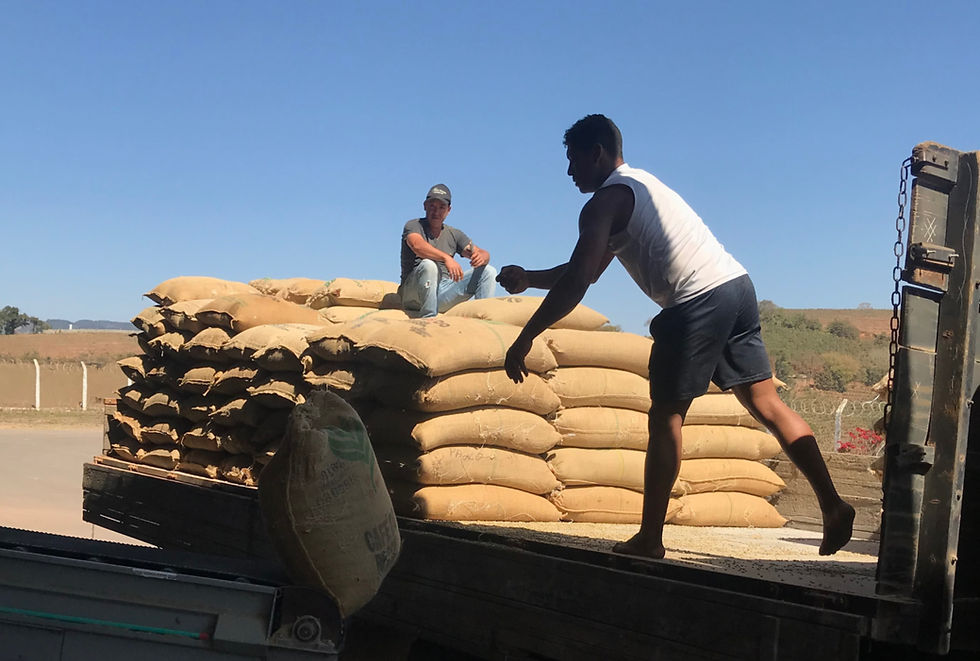Organic coffee from Brazil
- simondoebeli
- Aug 27, 2024
- 4 min read

Popular coffee for popular coffee blends
Coffee from Brazil is an important component of our coffee blends. For a coffee company like eKô, which only sells organic coffee, this is rather atypical. Why? Organic coffee from Brazil has a negligible share of less than 1% of the country's total production. Yet the country is the world leader in coffee production. Many people know, albeit unconsciously, the taste of Brazilian coffee and appreciate its flavours of nut and chocolate, especially in coffee blends. So from a culinary point of view, it makes perfect sense to favour Brazilian coffee. After all, we want everyone to drink better and more sustainable coffee. So what could be more obvious than making coffee blends that many people like?

Intensive land use
It is very important to us that our actions not only have an impact on consumers, but also at the source. Unfortunately, the country often relies on huge plantations with monocultures designed for mechanised harvesting. Production is highly specialised in many areas. This may make sense because of the large areas involved. However, we consider the associated land use, the use of pesticides and the treatment of the plants to be extremely intensive and unsustainable. We want to change that. Raphael and Lukas therefore deliberately set out in search of organic coffee in Brazil. They made the journey in August 2022. The endeavour was an important part of the launch phase of eKô.

Plan the trip
Where do you start your planning if you want to get the best possible picture of organic coffee production in Brazil? In Vanessa Heringer, we have found exactly the right person to talk to. She works for Algrano, lives in Brazil and is Brazilian. Her family owns their own coffee farm. Although heavily pregnant, Vanessa actively supported us with the planning and also accompanied us personally to the nearby farms. We spent nine days travelling through the states of Minas Gerais, Espirito Santo and São Paulo to seven different cooperatives.
The journey was characterised by several hours of driving, domestic flights and overnight stays in constantly changing hotels, but it was well worth it.

Producers
We got a good and interesting insight into organic production in Brazil. The people were very open-minded and often appeared very professional and self-confident. We know this differently from other countries.
On the other hand, the image of nature was not like in Honduras, Mexico or Peru. In most cases, even the organic farmland is not cultivated in a particularly diverse way.
In addition, we did not find any Fairtrade co-operatives that produce according to the Bio Suisse guidelines. However, we did visit Bio Suisse producers. However, these were companies owned by individual families that relied on day labourers and where the profits did not appear to be evenly distributed. During this phase, we made the decision to consciously focus on small farmers' co-operatives and the Fairtrade label. We were also impressed by the fact that small farmers tend to have more diverse areas under cultivation and that the harvesting work is mainly done within the farming families.


Coopfam
Our last stop on our trip took us to Poço Fundo in the south of Minas Gerais. Among other things, we visited the Coopfam cooperative there and were impressed from the outset by their extensive commitment. Here are just a few examples: There are two young Q-graders who take care of quality control. Coopfam has implemented various support programmes for organic production and trains the producers. Unlike in cooperatives with a large indigenous population, where living in harmony with nature is a matter of course, training in the protection of nature is of great importance here. Another highlight was the way in which women are consciously promoted in coffee production.
It was all a very good fit. For us as well as for Coopfam. Both pursue the goal of producing coffee that is both high quality and sustainable.

A living income for coffee producers in Brazil
In the eKô collective, we are used to orientating ourselves on the coffee price that the farmers tell us (if possible). After all, we want everyone along the coffee value chain to be able to live well. This was different in Brazil. Many cooperatives there orientate themselves strongly on the market price for Arabica coffee and add a premium of 150$ cents per pound. On the one hand, this is understandable, as all countries are orientated towards Brazil. On the other hand, this still surprised us. Especially because a lower price is also accepted and it is unclear whether a living income is guaranteed. In the 1:1 discussions with farmers, we certainly realised that the increased cost of living is a challenge. Nevertheless, the cooperative wanted to base its prices on the market price. We respected that. We will continue to pursue this point and are curious to see the effects should Fairtrade communicate a Living Income Reference Price for Brazil.
COOPFAM
BRASILIEN
Founded | 1986
Members | more than 400
Ø coffee acerage per producer | 5ha
Altitude | 950-1400m
Certification | EU Bio, USADA/NOP, Fairtrade
Process | Natural / Sun dried
Sustainability programmes |
Projekt Citizen School. High-quality education programmes for children of members of the cooperative. Partnership between Coopfam and the local government to promote women in the coffee sector.



Comments